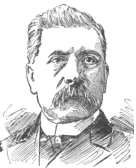DIAZ 528 DIAZ
Description
This page of the book is from "The New Student's Reference Work: Volume 1" by Chandler B. Beach, Frank Morton McMurry and others.
DIAZ
528
DIAZ
in the ocean that they form a large part of the free swimming organisms on the surface, and doubtless their siliceous skeletons are constantly falling on the sea-bottom. There are rock-deposits known asrottenearth, often used in polishing, that are absolutely made up of the skeletons ofdiatoms. On account of the fine lines which occur upon the siliceous walls, various diatoms have long been used as tests for microscopes, and the group is a favorite one with microscopists.
Diaz (dē'ńs), Bartolomeu, a Portuguese discoverer, who lived during the latter part of the 15th century. In August, i486, the king of Portugal placed him in command of two vessels, with which to follow up the discoveries that had been made by Portuguese adventurers on the western coast of Africa. Driven by a storm, he sailed around the southern end of Africa without at first knowing it, and discovered Algoa Bay. His crew were mutinous, and he was obliged to return to Portugal, where he was received with great enthusiasm. He joined, three years later, the expedition of Cabrai, a discoverer of Brazil, but was lost in a storm at sea, May 29, 1500.
Diaz, Porfirio. Thirty years ago it would have been unsafe for a well-dressed man to go about Mexico City unattended, while bandits infested the country-roads and robbed the mail-coaches. To-day there are 20,000 miles of railway, 40,000 miles of telegraph and 22,000 post-offices; the capital is lighted by electricity and , noisy with steam-I locomotives and trolley-cars; and Porfirio Diaz, ' ' perpetual president" of the republic goes about afoot or in his carriage. A handsome man of middleheight, he looks tall in that land of small men. In 1910, when this sketch was written, he was in his 80th year, his hair and mustache were snow white, but with his erect, soldierly carriage, fresh color and keen, black eyes he appeared to be in the prime of life. He had rounded out his seventh term or thirty-fourth year in the presidency, and had announced his intention of retiring. But the Mexican people would not permit him to do so and he was re-elected June 26, 1910.
To the life of this extraordinary man history offers no parallel. His career, his achievements and his position are unique. Alone and unaided, with ability matched only by incorruptible patriotism, Porfirio Diaz has transformed Mexico, lifted it from

PORFIRIO DIAZ
oblivion, rescued it from bankruptcy, brought order out of three centuries of chaos; won self-respect and the respect of the world for the people of Mexico from 300 years of degradation under Spanish rule.
In 1821 Mexico threw off the yoke of Spain and began its long struggle upward from poverty, ignorance and disorder. In the midst of the turmoil Porfirio Diaz was born on September 15, 1830, in the tropical state of Oaxaca. A typical Mexican of the poor class he was, and of mixed Spanish and native blood, for his grandmother was a Mixteco Indian. His father dying when he was three years of age, the boy roamed the cactus-and-aloe-strewn desert, and often sat at camp-fires with soldiers—government troops or rebels as it happened. At 17 he walked 250 miles to enlist in defense of his country in the Mexican War (1848), and saw half of Mexico's territory signed away to the United States in the year (1849) that gold was discovered in California.
That war over, Diaz became a rebel against Santa Anna's corrupt and oppressive rule. For the next 25 years, in fact, a Mexican patriot had no choice but to be a rebel and outlaw, for the country was ruled successively by dictators, despoilers and invaders. In 1862 President Juarez, thinking to relieve the impoverished land, suspended payment of the national debt to Great Britain, France and Spain. The United States, then in the second year of the Civil War, was unable to resist the invasion of Mexico by 40,000 French troops and the establishment of the Austrian archduke Maximilian as emperor in Mexico City. At the head of a patriot-army Diaz resisted French occupation. He was wounded, imprisoned, was a fugitive and an exile, had his army scattered, was offered bribes to desert his cause; but he helped bring about the downfall of the alien empire. Juarez again elected president (18 71) was the signal for a new revolution led by Diaz. The year 1877 saw the hero of 50 battles installed president in Mexico City by a victorious army.
The fighting stopped immediately, for the first time in 60 years. Mexico was told to go to work, live peacably and pay her debts. In theory the democratic form of government was preserved, but in practice the patriarchal was adopted. Diaz became the fatherly ruler, guiding and restraining. The people were poor and ignorant, the land devastated, perishing. After two generations of treachery, self-seeking and strife, education, industry, civic honesty and peace must slowly build up the land and people. Diaz stamped out rebellion relentlessly. It was years before the world understood his lofty patriotism. It was expected that he would declare himself dictator and then emperor. Rooted deep in the affections of the people, he could have


